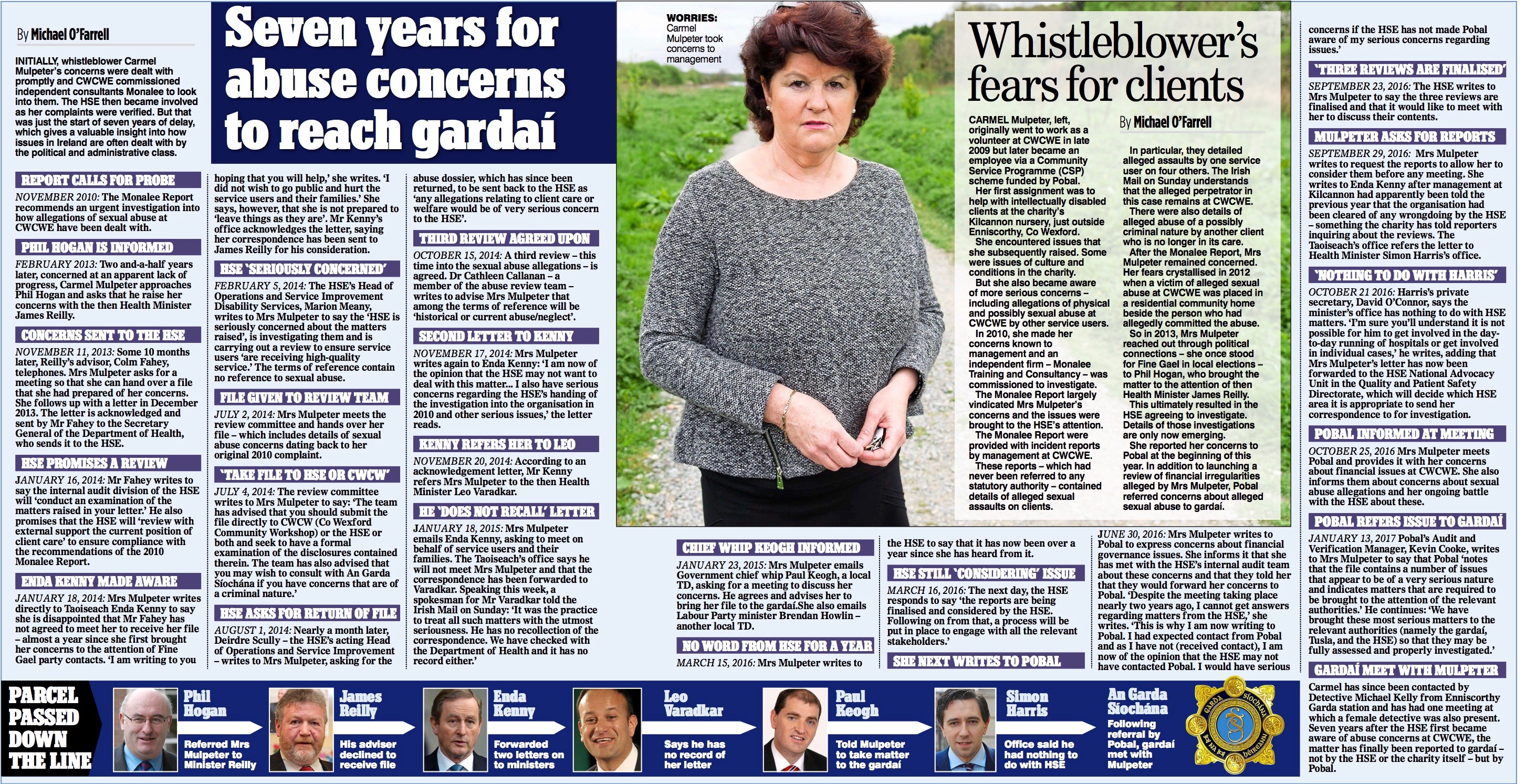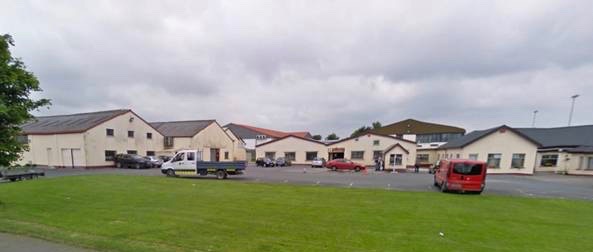By: Michael O’Farrell
Investigations Editor
GARDAÍ are investigating whether intellectually disabled clients at a south east charity may have been left at risk of sexual abuse, the Irish Mail on Sunday can reveal.
The Co. Wexford Community Workshop Enniscorthy – a charity getting more than €4m a year from taxpayers – also faces questions over governance and transparency including;
– Revelations that valuable contracts were paid to firms linked to board members;
– The fact that the charity’s long-standing auditor is a brother-in-law of a board member;
– The manner in which relatives of board members and staff were given paid jobs that were never advertised publicly.
One of the largest providers of services to the intellectually disabled in the south east, the workshop has 200 clients, 180 staff and 130 volunteers. When approached by the MoS, Chief Executive Trevor Jacob dismissed the issues raised – many of which were previously raised by a whistleblower – as groundless.
Whistleblower fears for clients led to new review
‘The HSE has concluded the allegations are groundless and give rise to no issues of concern whether in relation to alleged financial irregularities or the safeguarding of the interests of our vulnerable service users,’ he said.
He said CWCWE had been ‘fully exonerated’ by three HSE reviews, which the MoS has now obtained. One was into allegations including abuse of a ‘potentially criminal nature’ by someone known to the HSE as an alleged sexual predator. It confirms that neither the HSE nor CWCWE referred it to gardaí for inquiry.
A second review, into alleged financial irregularities, concludes that there were no grounds to substantiate any wrongdoings, However it said finances were put at risk by procedural weaknesses. The third found care standards ‘partially meet the standard’ required.
Allegations of abuse emerged in 2010 after the concerns of a whistleblower at CWCWE were largely vindicated by a confidential report known as the Monalee Report.

Information given to the team preparing that report detailed alleged assaults by one service user on four others. The MoS understands the alleged perpetrator remains at the workshop’s. There were also details of alleged criminal abuse by another client who is no longer in their care. Whistleblower fears that clients might remain at risk led to a new HSE review, completed in 2015.
According to that: ‘The potentially Criminal nature.’ of the allegations and the authority of the Garda Síochána to decide on the appropriateness of gardaí involvement was not considered.’ Allegations that emerged in 2010 were never reported to the statutory authorities until earlier this year, when one of workshop’s funders, Pobal, reported them to the gardaí.
The review says: ‘It appears where issues arose about alleged or potential sexual assault by one [former] service user there were no definitive protocols between the HSE and CWCWE for making decisions around the appropriateness of involving an Garda Síochána.’ It says that ‘concerns about inappropriate or predatory sexual behaviour appear to have been treated as issues for shared management between CWCWE and the HSE or referral for professional treatment, support and supervision by other professionals within the HSE’. An alleged assault by a ‘predatory’ service user in August 2010 saw the alleged perpetrator expelled permanently while the alleged victim was ‘referred for treatment and support’. Two years later the alleged victim was placed in independent community accommodation directly beside the alleged attacker.
The situation ‘may have drifted into a lack of clarity around the risk status of a service user suspected of sexually abusing, attempting to sexually abuse, or grooming others with a view to abuse,’ it says.

Last night a spokesperson for the HSE said: ‘The HSE is currently satisfied that CWCW is fully implementing the Safeguarding Vulnerable Persons at risk of abuse: National Policy and Procedures (2015). However, in the wake the Grace case, the HSE faces renewed questions about its management of abuse concerns in the South East.
The HSE’s review into financial allegations found there ‘did not appear to be grounds to substantiate any wrongdoing’. But the review made eight recommendations about governance weaknesses. Firms owned by some board members were paid for services without a policy in place to address possible conflicts of interest.
Auditors noted large items of expenditure were not being incurred according to HSE financial regulations. Under these regulations expenditure between €5,000 and €25,000 requires three written quotes, while greater expenditure requires a tendering process. And ‘extra cognisance should be paid to potential conflicts of interest where a company or service provider has links to the organisation’.
Contracts singled out by the HSE audit, that only examined accounts for 2013, included €18,750 paid to the charity’s auditor David Dowling, for which there was no evidence that three written quotes were not sought. Accounts show Mr Dowling’s firms received fees of €181,000 from CWCWE since 2002. The MOS has confirmed Mr Dowling is a brother-in-law of CWCWE director Michael White, something the HSE auditors were unaware of.
We asked Mr Dowling how he dealt with potential conflicts of interest that may have arisen and if he believes it appropriate to audit the accounts when a relative is on the board. He said he was ‘bound by rules governing client confidentiality’ and could not comment. Another contract was a €36,816 payment for vehicle and heating fuel to firms part owned by then CWCWE chairman PJ Darcy. CWCWE declined to answer MOS questions about how much may have been paid to Mr Darcy’s oil firms prior to 2013.
Firms related to six directors got payments
A third contract involved the purchase of a €20,000 insurance policy from Pat Kelly, an insurance broker and board member of CWCWE, for which there was no evidence that three written quotes were sought.
Mr Kelly is understood to have received up to €2,000 commission for the sale. An MOS analysis shows the charity has spent at least €325,000 on insurance since 2004. The MOS asked how much, if any, of this had been sourced by Mr Kelly’s firm. CWCWE did not answer this question. However the HSE told the MOS that Mr Kelly ‘had given an undertaking to withdraw his services from 2015 onwards’.
Firms related to six directors of CWCWE got payments from the charity in recent years. Because of the potential for conflicts of interest, the audit recommended it put in place a register of members interests, which must be regularly updated and referred to when major purchasing decisions are being planned. This has now been done.
HSE auditors also found 10 relatives of directors and staff members had been given jobs with salaries ranging from €929 to €15,529 in 2012/13.
The review recommended CWCWE should ‘only recruit staff who have been put through a competitive recruitment process’.
